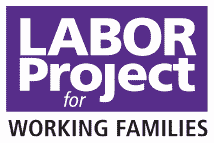Stop Brooding and Organize!

By Carol Joyner
America’s Labor Day was established as a federal holiday in 1894. It was signed into law by Grover Cleveland in order to appease workers brooding about the disastrous Pullman Strike, in which railway workers fought severe pay cuts by bringing railroads to a grinding halt across the country. This was the “Gilded Age,” in which one percent of the population held 50 percent of the nation’s wealth. The working poor existed below the poverty line and the poor lived in the streets. Women, children and people of color were all second-class citizens.
Sound familiar?
We’ve advanced in many ways since the first Labor Day but serious inequalities still exist. Women are now 50 percent of the workforce and the head of a majority of American households. But women still earn only 77 cents for every dollar that men earn and, to the economic peril of our nation’s families, many national leaders pretend that the wage gap doesn’t exist. Forty percent of all workers and 75 percent of low-wage workers don’t have a single paid sick day, meaning they could lose their job if they get sick or need to stay home to care for a sick child. The minimum wage remains at 1970 levels ensuring that most low-wage workers must rely on public assistance to support their families.
A 2011 Congressional report suggests we may be returning to the Gilded Age, because “the 400 richest people in the country control more wealth than the bottom 50 percent of households.”
Rich corporations like Walmart and McDonalds and their trade associations promote economy-busting jobs that are low wage, have irregular schedules, no benefits, and no paid sick time. And taxpayers are subsidizing these profitable chains when their workers need food stamps and public assistance to survive.
We need economy-boosting jobs that ensure that all working people earn enough money to cover the basics: food, housing, clothing, healthcare, car repairs, etc. When working people have a little money in their pockets to spend, it keeps the economy moving, and that helps business, too. It’s not complicated.
Low wage workers from every sector of the economy are standing up for all of us by demanding higher wages, paid sick days, overtime protections, and recourse against wage theft.
A movement for paid sick days is growing around the country. Community and labor coalitions have won paid sick days for millions of workers in: San Francisco, Washington D.C., Seattle, Portland, New York City and the state of Connecticut. What’s becoming clear is that our economy suffers when workers are forced to choose between their health and their job.
Fast-food workers kicked off this Labor Day with strikes in almost 60 cities. Thousands of workers took to the streets on Thursday demanding a raise from $7.25 to $15 per hour and the right to form a union without fear of intimidation.
Retail workers across the country are also organizing for change. Seen best in the recent mobilizations against the retail giant Walmart, OURWalmart is changing how we view retail work and corporations who exploit their workers.
Restaurant Workers are organizing for an end to the tipped minimum wage of $2.13 per hour, for paid sick days, and improved working conditions. Domestic workers are organizing because, like agricultural workers they remain excluded from our nation’s key labor law: the Fair Labor Standards Act. Their exclusion from minimum wage and other protections promotes an underclass that slows down our economy.
On this Labor Day workers aren’t brooding; they’re organizing. We need to stand with them to help boost our economy.
